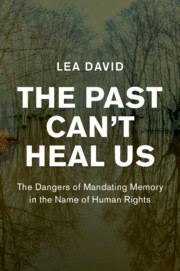Crossref Citations
This Book has been
cited by the following publications. This list is generated based on data provided by Crossref.
David, Lea
2019.
Human rights, micro-solidarity and moral action: ‘Face-to-face’ encounters in the Israeli/Palestinian context.
Thesis Eleven,
Vol. 154,
Issue. 1,
p.
66.
Bekus, Nelly
2021.
Symbolic Capital of the Memory of communism. The quest for international recognition in Kazakhstan.
Theory and Society,
Vol. 50,
Issue. 4,
p.
627.
Bădescu, Gruia
2021.
Homelands and dictators: migration, memory, and belonging between Southeastern Europe and Chile.
Journal of Contemporary European Studies,
p.
1.
Kidron, Carol A.
2021.
‘Rebirthing’ the Violent Past: Friction Between Post-Conflict Axioms of Remembrance and Cambodian Buddhist Forgetting.
Anthropological Forum,
Vol. 31,
Issue. 3,
p.
291.
Craps, Stef
and
Gilbert, Catherine
2021.
Memory dynamics in times of crisis: An interview with Sarah Gensburger.
Memory Studies,
Vol. 14,
Issue. 6,
p.
1388.
Schaafsma, Juliette
Zoodsma, Marieke
and
Sagherian-Dickey, Thia
2021.
Closing chapters of the past? Rhetorical strategies in political apologies for human rights violations across the world.
Journal of Human Rights,
Vol. 20,
Issue. 5,
p.
582.
Rawski, Tomasz
2021.
The Persistence of National Victimhood: Bosniak Post-War Memory Politics of the Srebrenica Mass Killings.
Sprawy Narodowościowe. Seria nowa,
Willems, Eva
2022.
Concealment, coexistence, and citizenship: (Post-)conflict strategies of survival and inclusion in Sacsamarca, Peru.
Memory Studies,
Vol. 15,
Issue. 4,
p.
898.
McGlynn, Jade
and
Jones, Oliver T.
2022.
Researching Memory and Identity in Russia and Eastern Europe.
p.
1.
Rodéhn, Cecilia
2022.
The emotional heritage of psychiatric hospital and asylum cemeteries as constructed in and through academic texts.
International Journal of Heritage Studies,
Vol. 28,
Issue. 9,
p.
1002.
McQuaid, Sara Dybris
2022.
Explosive aftermaths: Reassembling transnational memory- and policyscapes of victims and terrorism in the United Kingdom.
Memory Studies,
Vol. 15,
Issue. 6,
p.
1434.
Deim, Reka
2022.
Entanglements of art and memory activism in Hungary’s illiberal democracy.
International Journal of Heritage, Memory and Conflict,
Vol. 2,
Issue. ,
p.
61.
Olsson, Christian
and
Malešević, Siniša
2022.
The Palgrave Handbook of the History of Human Sciences.
p.
1.
Sendyka, Roma
2022.
Non-memory: Remembering beyond the discursive and the symbolic.
Memory Studies,
Vol. 15,
Issue. 3,
p.
523.
Wawrzyniak, Joanna
2022.
The Palgrave Handbook of the History of Human Sciences.
p.
1.
Sodaro, Amy
2022.
Race, memory and implication in Tulsa’s Greenwood Rising.
Memory Studies,
Vol. 15,
Issue. 6,
p.
1378.
Gissel, Line Engbo
2022.
The standardisation of transitional justice.
European Journal of International Relations,
Vol. 28,
Issue. 4,
p.
859.
Andersen, Tea Sindbæk
and
Borčak, Fedja Wierød
2022.
Memory conflicts and memory grey zones: War memory in Bosnia–Herzegovina between public memory disputes, literary narratives and personal experience.
Memory Studies,
Vol. 15,
Issue. 6,
p.
1517.
Bădescu, Gruia
2022.
Contested Urban Spaces.
p.
229.
Wawrzyniak, Joanna
2022.
The Palgrave Handbook of the History of Human Sciences.
p.
775.



